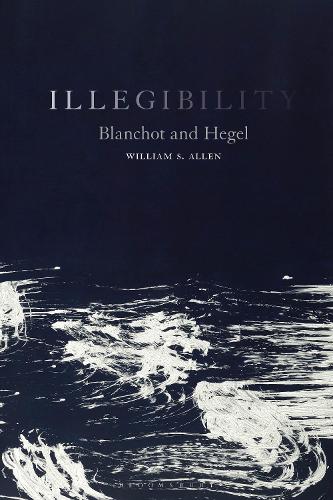
Illegibility: Blanchot and Hegel
(Paperback)
Available Formats
Publishing Details
Illegibility: Blanchot and Hegel
By (Author) Dr William S. Allen
Bloomsbury Publishing PLC
Bloomsbury Academic USA
26th January 2023
United States
Classifications
Tertiary Education
Non Fiction
Philosophy of language
Philosophy of mind
Essays
848.91409
Physical Properties
Paperback
264
Width 152mm, Height 229mm
Description
The philosophical significance of Maurice Blanchots writings has rarely been in doubt. Specifying the nature and implications of his thinking has proved much less easy, particularly in reference to the key figure of G. W. F. Hegel. Examination reveals that Blanchots thinking is persistently oriented towards a questioning of the terms of Hegels thought, while nevertheless remaining within its themes, whichshows how rigorously he studied Hegels works but also how radical his critique of them became. Equally, it allows for a crucial discussion of the differences between Blanchots responses to Hegel and those of Jacques Derrida, with the implicit suggestion that in some ways Blanchots critique of Hegel is more far-reaching than that developed by Derrida. William S. Allen demonstrates those aspects of Hegelian thought that permeate Blanchots writings and, in turn, develops a detailed three-way analysis of Derrida, Hegel, and Blanchot. The key question around which this analysis develops is that of the relation between thought and language concerning the issue of the infinite and its legibility. Illegibility introduces a new and substantially philosophical account of Blanchots importance, and also showshow his writings laid the ground for Derridas workswhile developing their own uniquely challenging response to the problems of post-Hegelian thought.
Reviews
[Allens] work offers a forceful corrective to the simplifications or even outright parodies of Hegel one sometimes finds in work on Blanchot and many of his fellow-travellers in twentieth-century French literary philosophy ... Allens book is unlikely to be surpassed as a philosophically robust and clearsighted guide to the entretien infini between Hegel and Blanchot, philosophy and literature, and negation and negativity. * Hegel Bulletin *
How does one approach a written work that problematizes the regulative ideal of a legible book This question is associated with Derridas deconstruction of Hegel. As William S. Allen demonstrates in this fascinating study, it was posed in a unique way by Blanchot, whose own engagements with Hegel invite us to rethink the relation between the terms diffrance and aufheben. * Andrew Cutrofello, Professor of Philosophy, Loyola University Chicago, USA *
Illegibility: Blanchot and Hegel applies near-exhaustive knowledge, and laser-like insights, to develop a reading of Hegel through Blanchot, with judicious reference to other thinkers such as Derrida. Hegel stands as a figure for a type of double, even dialectical reflection, in which Blanchot found inspiration even as he challenged and rewrote the Enlightenment philosopher's thinking. Allens profound and sustained analysis, based on careful attention to texts, represents what the humanities is best able to do, and he proceeds by means of a nonetheless rigorous scientificity that should be the gold standard for researchers in any field. * David Wills, Professor of French Studies and Director of Graduate Studies, Brown University, USA *
Author Bio
William S. Allen (PhD, University of Warwick) is an independent researcher at the University of Southampton, UK, and the author of the following books: Adorno, Aesthetics, Dissonance: On Dialectics in Modernity (Bloomsbury, 2022); Noir and Blanchot: Deteriorations of the Event (Bloomsbury, 2020); Blanchot and the Outside of Literature (Bloomsbury, 2019); Without End: Sades Critique of Reason (Bloomsbury, 2018); Aesthetics of Negativity: Blanchot, Adorno, and Autonomy (2016); and Ellipsis: Of Poetry and the Experience of Language after Heidegger, Hlderlin, and Blanchot (2007).
